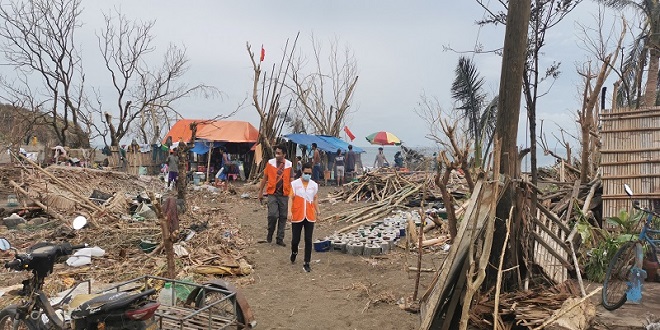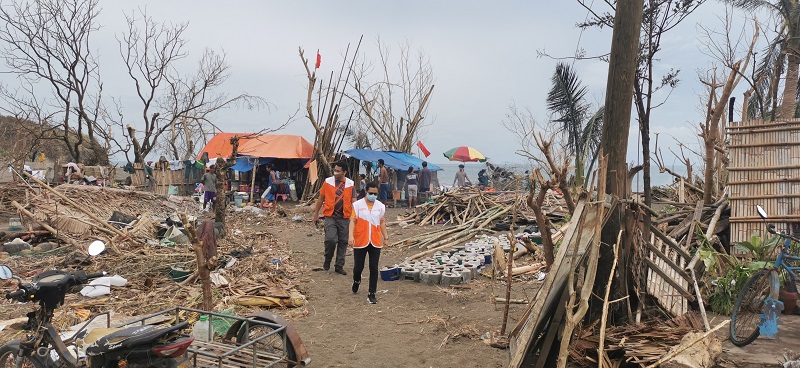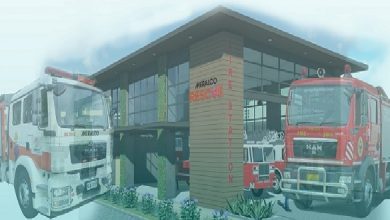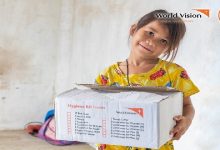
Following the onslaught of Super Typhoon Goni (local name Rolly), international NGOs Oxfam, ADRA, and World Vision, together with local partners Coastal core and Peoples’ Disaster Risk Reduction Network, with funding from the European Civil Protection and Humanitarian Aid Operations (ECHO), will provide immediate aid to the most affected communities in the hard-hit areas of the Bicol region. These areas include the provinces of Albay, Camarines Sur, and Catanduanes.

The massive response focuses on providing assistance in shelter, water, sanitation, and hygiene (WaSH), food, and protection initiatives.
ECHO is providing 1.3 million euro or around PHP73 million in rapid humanitarian aid funding to assist families affected by Super Typhoon Rolly until April of 2021.
“The consortium aims to reach over 49,000 disaster-affected people in the Bicol region. We prioritize critical life-saving aid, such as water, sanitation, hygiene awareness and protection, and food and cash. We are committed to delivering fast, effective, and contextually appropriate responses to disaster-affected communities while ensuring that the most vulnerable groups can access support in a safe and participatory manner. Central to this commitment is that the needs of the most vulnerable should be front and center of our emergency assessment and response,” said Lot Felizco, Country Director of Oxfam Philippines.

A double crisis
Over the past months, the country has been battered by successive typhoons, especially in the Bicol region. The National Disaster Risk Reduction and Management Council (NDRRMC) reports that Super Typhoon Goni alone has affected over 2 million people nationwide, and left Php 12 billion ($ 240 M) worth of damage to infrastructure, including 170,000 houses damaged. Days after, typhoon Vamco (local name Ulysses) entered the Philippines, which further aggravated the situation of families barely coping from Goni.
“Families have been reeling from successive emergencies. This funding from ECHO is timely. Delay or lack of humanitarian interventions could pose threats to the well-being of the most vulnerable groups. The national weather bureau PAGASA said that the country is to expect more typhoons until the end of the year. Imagine the thousands of families who are without safe shelter or emergency essentials — they are more prone to getting diseases if we do not act fast,” said Rommel Fuerte, national director for child-focused World Vision.
According to Esteban Masagca, PDRRN Executive Director, “We also continue to call on the local governments to ensure that necessary health protocols are in place to stop the spread of COVID-19. This humanitarian response is more complicated because we are in the middle of a pandemic. While urgent action is needed, we should also not let our guards down.”
Priorities include shelter, humanitarian cash, and safe water
Shelter assistance includes the provision of shelter repair kits, distribution of family-sized blankets, sleeping mats, mosquito nets, hand-held solar lamp, support for camp management, and cash support for host families. Cash transfer program for food assistance is also seen while water, sanitation, and hygiene (WaSH) interventions include the provision of basic WaSH supplies, water rationing, distribution of water kits and water treatment, hygiene promotion, and construction and repair of water facilities.
“We have served communities in Bicol Region long before the typhoons struck, and we will continue our work alongside them long after they have passed. Access to health and nutrition has always been a challenge. COVID-19 has threatened the communities, and now these typhoons have ripped apart homes and livelihoods. We are committed to stand alongside these communities and serve those families affected in their greatest hour of need,” noted Tom Pignon, Country Director of ADRA Philippines.







